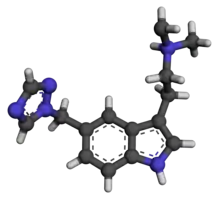Rizatriptan
Rizatriptan, sold under the brand name Maxalt among others, is a medication used for the treatment of migraine headaches.[1] It should be used as soon as the headache starts.[2] It is taken by mouth.[1]
 | |
 | |
| Clinical data | |
|---|---|
| Trade names | Maxalt, others |
| AHFS/Drugs.com | Monograph |
| MedlinePlus | a601109 |
| License data | |
| Pregnancy category | |
| Routes of administration | By mouth |
| Drug class | Triptan |
| ATC code | |
| Legal status | |
| Legal status |
|
| Pharmacokinetic data | |
| Bioavailability | 45% |
| Protein binding | 14% |
| Metabolism | by monoamine oxidase |
| Elimination half-life | 2–3 hours |
| Excretion | 82% urine; 12% faeces |
| Identifiers | |
| |
| CAS Number | |
| PubChem CID | |
| IUPHAR/BPS | |
| DrugBank | |
| ChemSpider | |
| UNII | |
| KEGG | |
| ChEBI | |
| ChEMBL | |
| CompTox Dashboard (EPA) | |
| ECHA InfoCard | 100.243.719 |
| Chemical and physical data | |
| Formula | C15H19N5 |
| Molar mass | 269.352 g·mol−1 |
| 3D model (JSmol) | |
| |
| |
| | |
Common side effects include chest pain, dizziness, dry mouth, and tingling.[1] Other side effects may include myocardial infarction, stroke, high blood pressure, serotonin syndrome, and anaphylaxis.[1] Excessive use may result in medication overuse headaches.[1] Use is not recommended during pregnancy and breastfeeding is not recommended within 24 hours after taking a dose.[2] Rizatriptan is in the triptan class and is believed to work by activating the 5-HT1 receptor.[1]
Rizatriptan was patented in 1991 and came into medical use in 1998.[3] It is available as a generic medication.[2] In 2017, it was the 204th most commonly prescribed medication in the United States, with more than two million prescriptions.[4][5]
Medical uses
Rizatriptan is used to treat acute migraine attacks with or without aura. It does not prevent future migraine attacks.[6] A 2010 review found rizatriptan to be more efficacious and tolerable than sumatriptan.[7]
Contraindications
Rizatriptan and other triptans can cause vasoconstriction, they are contraindicated in people with cardiovascular conditions.[8]
Adverse effects
Frequent adverse effects (incidence less than 10%) are dizziness, drowsiness, asthenia/fatigue, and nausea. Clinical adverse experiences were typically mild and short-lasting (2–3 hours).[8]
Interactions
Mechanism of action
Rizatriptan acts as an agonist at serotonin 5-HT1B and 5-HT1D receptors.[10] Like the other triptans sumatriptan and zolmitriptan, rizatriptan induces vasoconstriction—possibly by inhibiting the release of calcitonin gene-related peptide from sensory neurons in the trigeminal nerve.[10]
Society and culture
It is typically by prescription except in Brazil.
Names
Brand names include Bizaliv, Rizalt, Rizact (India) and Maxalt.
References
- "Rizatriptan Benzoate Monograph for Professionals". Drugs.com. American Society of Health-System Pharmacists. Retrieved 18 March 2019.
- British national formulary : BNF 76 (76 ed.). Pharmaceutical Press. 2018. p. 473. ISBN 9780857113382.
- Fischer J, Ganellin CR (2006). Analogue-based Drug Discovery. John Wiley & Sons. p. 531. ISBN 9783527607495.
- "The Top 300 of 2020". ClinCalc. Retrieved 11 April 2020.
- "Rizatriptan Benzoate - Drug Usage Statistics". ClinCalc. Retrieved 11 April 2020.
- "Rizatriptan". MedlinePlus. U.S. National Library of Medicine.
- Göbel H (2010). "Efficacy and tolerability of rizatriptan 10 mg compared with sumatriptan 100 mg: an evidence-based analysis". Expert Rev Neurother. 10 (4): 499–506. doi:10.1586/ern.10.24. PMID 20367203. S2CID 43395810.CS1 maint: uses authors parameter (link)
- Hargreaves RJ, Lines CR, Rapoport AM, Ho TW, Sheftell FD. (2009). "Ten years of rizatriptan: from development to clinical science and future directions". Headache. 49: S3–S20. doi:10.1111/j.1526-4610.2008.01335.x. PMID 19161563.CS1 maint: uses authors parameter (link)
- Millson DS, Tepper SJ, Rapoport AM (March 2000). "Migraine pharmacotherapy with oral triptans: a rational approach to clinical management". Expert Opinion on Pharmacotherapy. 1 (3): 391–404. doi:10.1517/14656566.1.3.391. PMID 11249525. S2CID 36053513.
- Wellington K, Plosker GL (2002). "Rizatriptan: an update of its use in the management of migraine". Drugs. 62 (10): 1539–74. doi:10.2165/00003495-200262100-00007. PMID 12093318.
External links
- "Rizatriptan benzoate". Drug Information Portal. U.S. National Library of Medicine.
